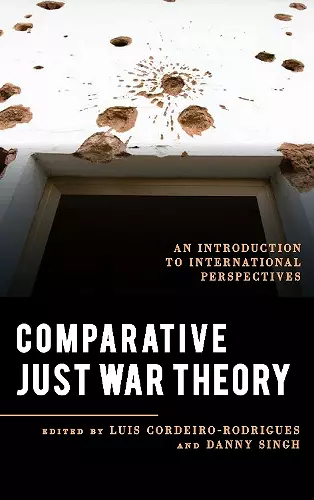Comparative Just War Theory
An Introduction to International Perspectives
Danny Singh editor Luis Cordeiro-Rodrigues editor
Format:Paperback
Publisher:Rowman & Littlefield
Published:23rd Oct '19
Currently unavailable, and unfortunately no date known when it will be back

There are a variety of reasons why it is important to have widespread cross-cultural and cross-ideological agreement regarding how to fight war (jus in bello) and when to enter war (jus ad bellum). Firstly, international humanitarian law was created in the West and states of power may either sidestep or use these norms as a political umbrella to pursue realist political ambitions. Secondly, war involves addressing the morality of killing and using violence and these two are normally impermissible. It is important to avoid biased perspectives and find a reasonable agreement. Thirdly, attacking compounds and media systems that serve military purposes can result to unnecessary deaths of civilians when the rule of proportionality is exercised. Fourthly, there is an increasing involvement of different countries in each other’s’ security legislation. Common grounds on how to understand war are necessary to explore. The major theme of this edited book will precisely address issues regarding the morality of war from a comparative perspective. The chapters in this book will look at two important debates regarding war ethics: a) when is it morally justified to enter in war? b) If one is in war, what are the morally acceptable violent methods? These topics have been debated substantially in the Western liberal context. What this volume does new is to address these topics taking into consideration concepts from non-mainstream Western and non-Western philosophical theories, with the use of concrete examples. Particularly, this means addressing those two issues taking into consideration concepts like Confucian Yi/Rightness, Ahimsa, Class Struggle, Ubuntu, Anarchism, Pacifism, Buddhism, Islam, Jihad, among other concepts. Therefore, this book provides a wider conceptual framework to deal with the morality of war by offering a comparative philosophical approach to just war theory. Fresh insights into how the normative problems that arise from just war can be addressed. Ethnocentrism and the preservation of superpowers’ interests dominate international politics, contravene international law and are not compliant with just war theory. The world organization is largely driven (as a facilitator) for superpowers’ geopolitical interests to wage war, even if not morally justified, and stretching the boundaries of international law. By way of illustration, United Nations (UN) weapons inspectors did not find weapons of mass destruction under Security Council Resolution 1441 (2002) in Iraq but...
This is a much-needed volume on just war theory from multicultural perspectives. It will be a very useful resource for students in a globalized world. -- Chenyang Li, author of The Confucian Philosophy of Harmony
Just war theory in the Anglophone world has been largely informed—and limited—by the Christian and liberal traditions. This book paves the way for a truly global approach to theorizing about just war. -- Daniel A. Bell, Shandong University, author of The China Model
These stimulating and diverse essays—well-curated from traditionally under-represented perspectives—advance our thinking about the ethics of war and peace. -- Brian Orend, University of Waterloo, and author of War and Political Theory
ISBN: 9781538125144
Dimensions: 222mm x 154mm x 16mm
Weight: 399g
284 pages